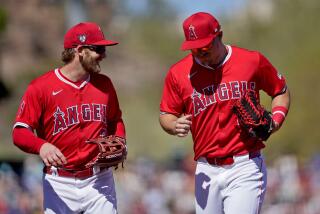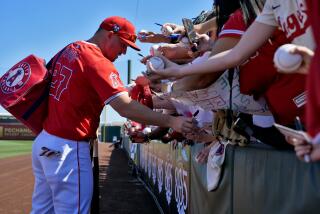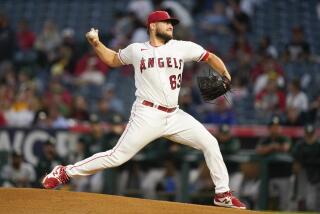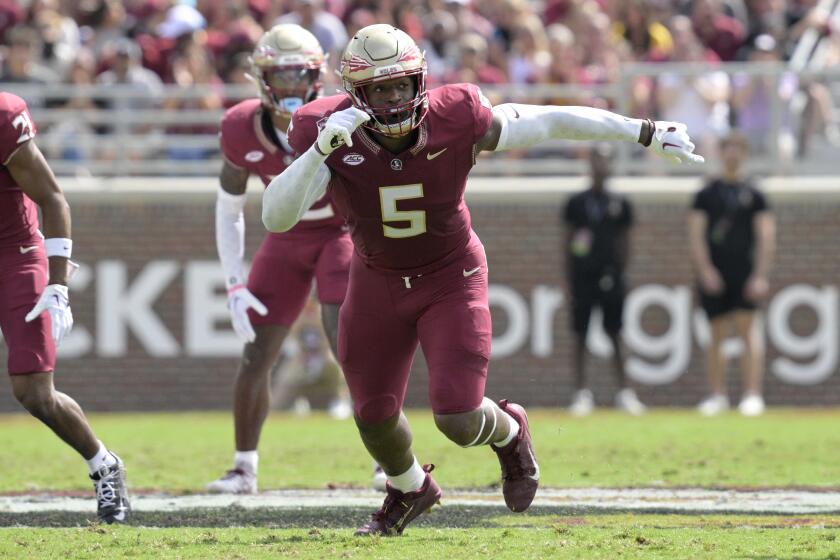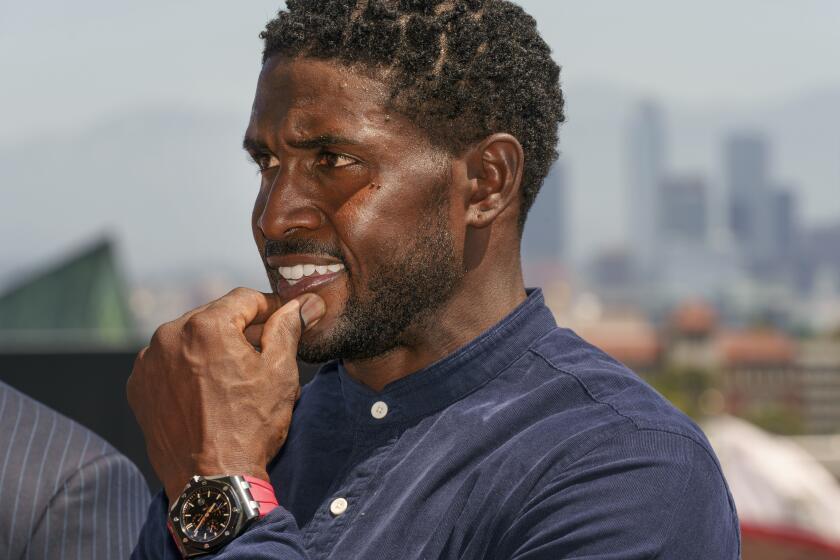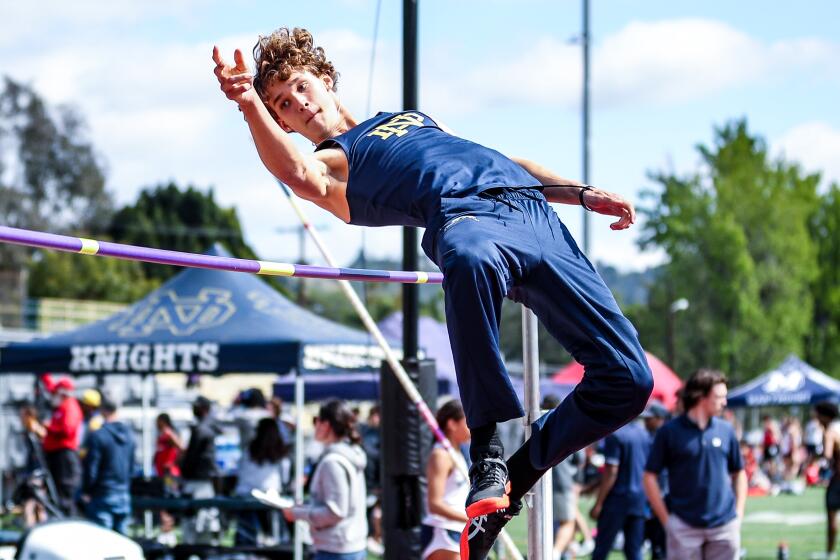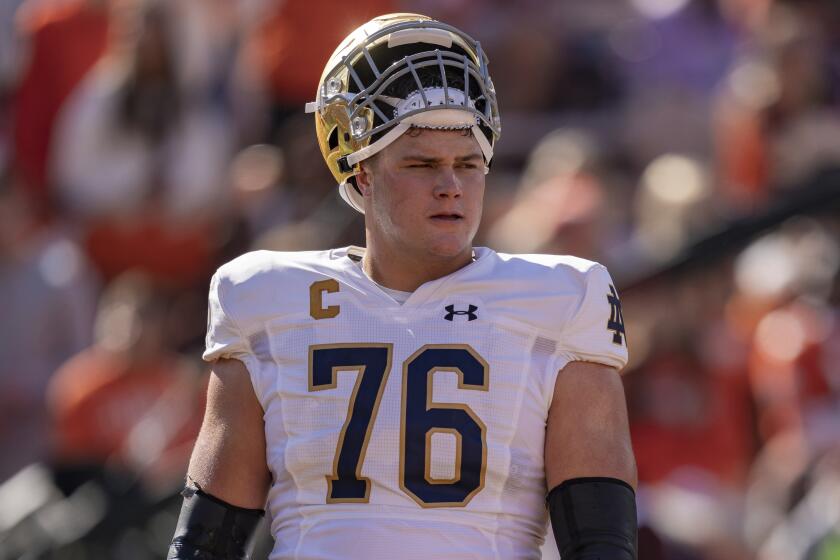Angels lefty C.J. Wilson’s mind is always racing
No wonder C.J. Wilson struggles occasionally with insomnia. Who can sleep when your mind is racing like the Porsche GT3 RS the new Angels left-hander says he once cranked up to 165 mph at the Fontana raceway?
“I get up and I have 10 things I want to do every day,” Wilson says during a recent interview over breakfast in West Hollywood. “I’ve had teammates who sleep for 10 or 12 hours a night. I don’t know how people do that.”
It seems 24 hours a day isn’t enough for Wilson, the former Texas Rangers ace who signed a five-year, $77.5-million deal with the Angels in December and will join pitchers and catchers for their first spring-training workout Monday in Tempe, Ariz.
Whether it’s learning the best pitch sequence to attack a hitter, the optimum workout regimen, the right tweak to a race-car engine, how to land a passenger jet or the secret to the perfect frittata, Wilson seeks to challenge his restless mind, push his body and add zest to his life.
“I’ve dubbed him the Most Interesting Man in the World,” Angels General Manager Jerry Dipoto says. “He’s like the guy in those Dos Equis commercials.”
Growing up in Southern California — he attended Fountain Valley High School, Santa Ana College and Loyola Marymount, where he majored in screenwriting — Wilson always had a thirst for knowledge.
He says he began devouring sports psychology books when he was 12 and often stayed up late with a flashlight in his bedroom reading how-to baseball books by stars such as Tom Seaver and Wade Boggs.
But the real turn in his life came when his baseball career took an apparent turn for the worse — reconstructive elbow surgery that sidelined him for 18 months after his 2003 season at double-A Frisco, Texas.
The Rangers sent Wilson to their spring complex in Surprise, Ariz., where his only requirement was to report for an hour of rehabilitation a day.
“There was nothing to do, so I just read,” Wilson says. “In 18 months, I read 200 to 300 books.
“I learned how to cook, how to get myself in better shape. … It kicked off this thing where every year I try to learn a new skill. It was the best thing that ever happened to me.”
One winter, Wilson spent several hours in a Southwest Airlines flight simulator to learn how to land a 737, a handy skill should the pilots on the Angels’ charter fall ill. He has learned martial arts and how to spin records as a disc jockey.
He has immersed himself in photography, dancing — “Great exercise,” he says — oil painting and music, learning to play guitar and piano. He says he’s also a certified personal trainer who, as part of the “straight-edge” lifestyle he adopted as a teenager, abstains from drugs, tobacco and alcohol.
Wilson speaks Spanish, some Italian and Japanese. And he began writing a novel about a dead minor leaguer whose journal is discovered by his family.
Wilson has studied Eastern philosophy, including Taoism. He’s active on Twitter, with almost 113,000 followers — his handle is “str8edgeracer” — and he’s certain he’s the only big leaguer following the Dalai Lama.
He has worked out with Olympic athletes, NFL players and mixed martial arts fighters, and says he has done focus and pain-aversion exercises with Navy SEALs.
“I don’t watch TV, so I have two to three hours a day nobody else has,” Wilson says. “It’s important for me to live a rich, long life and be healthy.”
Which seems contrary to the hobby he’s most passionate about: car racing.
Wilson grew up around the track — his father worked on a pit crew — and as a child he raced go-karts and couldn’t get enough of racing video games.
In 2006, his second year in the big leagues, he went to a Dallas-area track to ride in a modified street car. “It was the best time I ever had,” Wilson says. He bought his own car and trailer that winter and drove tracks throughout California.
Wilson started his own racing team in 2010, a year in which he drove 596 laps of an endurance race in Sacramento. He now owns seven cars that are rented by drivers on the Mazda MX-5 and Grand-Am racing circuits.
“A lot of guys golf, hunt, and if you take that hobby seriously, by definition, you’re focused at it,” Wilson says. “The difference with racing is it’s dangerous. It’s adrenaline. You operate at a similar heart-rate level as pitching.
“When you’re golfing, your heart rate is not 130, 140 [beats per minute]. You’re not sweating. There’s nothing at stake except maybe a couple of bucks if you’re playing with Charles Barkley. If you’re driving a race car, your mental agility is so much higher, you get used to that level of operation.”
His deal with the Angels prohibits racing, but Wilson expects to reap benefits from the experience and anticipates returning to the track after his playing career.
“Racing teaches you that anything is possible with the right amount of focus and concentration,” he says.
Wilson is still a work in progress as a pitcher. He moved from the bullpen to the rotation after 2009 and was Texas’ ace for most of 2010 and 2011, going a combined 31-15 with a 3.14 earned-run average, 376 strikeouts and 167 walks — a way-too-high 93 in 2010 and a still-too-high 74 in 2011 — in 427 1/3 innings and helping the Rangers reach the last two World Series.
However, Wilson has struggled in the postseason; he has a 1-5 record with a 4.82 ERA, 43 strikeouts and 29 walks in 52 1/3 innings in 10 games, nine starts.
He says that he was “a little fatigued” going into last October and that he “had some pretty bad personal stuff going on” that was not disclosed then and he declines to talk about now.
That was hardly a deterrent to the Angels, who love Wilson’s competitiveness, eagerness to learn and low mileage — only 708 innings in seven years.
“He doesn’t have the innings most guys his age have,” Dipoto says. “That’s an advantage for C.J. and us.”
Wilson may also enter the season with a bit of a chip on his shoulder toward the Angels’ American League West rival. The Rangers failed to give him a formal contract offer, then sank nearly $112 million into bringing in Yu Darvish, a Japanese right-hander who has never thrown a pitch in the big leagues.
“That was kind of surprising because they told me they didn’t have any money, but you know how that goes,” Wilson says. “You realize they were probably after Darvish the whole time. You don’t spend $111 million on a guy on a whim. That’s not an impulse buy.”
Miami offered Wilson more money, a six-year deal for about $100 million, but the Angels closed what was once a $30-million gap in offers on the final night of baseball’s winter meetings.
Wilson wanted to pitch at home — “It’s like a dream situation, being from Southern California,” he said — and when he heard the Angels were signing slugger Albert Pujols, that solidified his decision.
He joins Jered Weaver, Dan Haren and Ervin Santana in a formidable starting rotation.
“Each one of those dudes has a pitch or a style I can learn from,” says Wilson, who throws a fastball, cut-fastball, slider, curve, split-fingered fastball and changeup. “Weaver has the best changeup in the league, and that’s my worst pitch. If my changeup improves, it will take me to another level.
“I feel like I owe it to myself, the team and the fans to get better. I want to overpay in sweat equity what I’m getting paid to pitch.”
twitter.com/MikeDiGiovanna
More to Read
Get our high school sports newsletter
Prep Rally is devoted to the SoCal high school sports experience, bringing you scores, stories and a behind-the-scenes look at what makes prep sports so popular.
You may occasionally receive promotional content from the Los Angeles Times.
